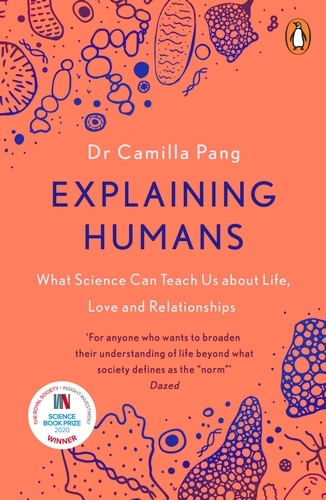In 2020, Pang published her book "Explaining Humans: What Science Can Teach Us about Life, Love and Relationships". It is the winner of the Royal Society Science Book Prize 2020, in which Pang shares how science has lit the spark in her to cope with being an "outlier".
The outsider’s story starts with her experience of the world as a bit too tense and herself as a dysrhythmia of her peer species. Diagnosed with autism at the age of eight and later a combination of ASD, ADHD and GAD, she describes the experience as if the senses are “on fire”, “you can’t really find your place” and the social activities that involve so many nuances are too opaque to understand. In her childhood, reading science books was a way she used to shelter herself from the unpredictable world. She finds clarity in the world of science, where there are clear-cut definitions of almost everything and explanations of how things work. It makes her wonder if there is also a manual to explain how humans work, so she can get rid of the uncertainties that overwhelmed her.
It turns out that she is the one that creates such a manual. By looking into proteins, she rethinks human relationships and interactions. By understanding thermodynamics, she gets to know the struggle to create order in our lives. By explaining how machine learning works, she shares how she is inspired to make more organized decisions. In her accounts a reader learns that algorithms do not only categorize but seek new patterns beyond prescription, just as our brains function not only by putting information into boxes but connecting the known to the unknown like a tree spreading its branches. Knowledge travels, across disciplines and from the micro to the many more dimensions of life.
“By understanding scientific principles, we can better understand our lives as they really are: the source of our fears, the basis of our relationships, the functioning of our memory, the cause of our disagreements, the instability of our feelings and the extent of our independence.”
That said, she does not agree that science is a prescribed formula. As technical and crystal-clear as it might seem, it is always unsettling. In an interview with Wired, when asked if there is an ultimate thing that science teaches her about human, she says,
“With all its security and facts and stability, that it isn't a solution, it's a process. It's about giving things a go. And that everyone's just trying to get through and seek the truth of what is going on. I think that's wicked.”
From Pang I think what a scientific mindset strives to inspire ultimately is sincerity and compassion from each of us in the world. People can live life “through a different dimension to what the system was taught”. While we think of them as rigid, chances are they are shielding themselves from the intrusion of what we consider normality, and we are also too conformed to our niches. But what if “difference is an unorthodox blessing” and all of those being different “are the most rational and beautiful inevitabilities”? Are we sincere enough to study ourselves inside-out and carry on this life-long scientific project?
Reference
Camilla Pang's blog
Camilla Pang’s speech: On Being Weird
The Wired's interview with Camilla Pang

